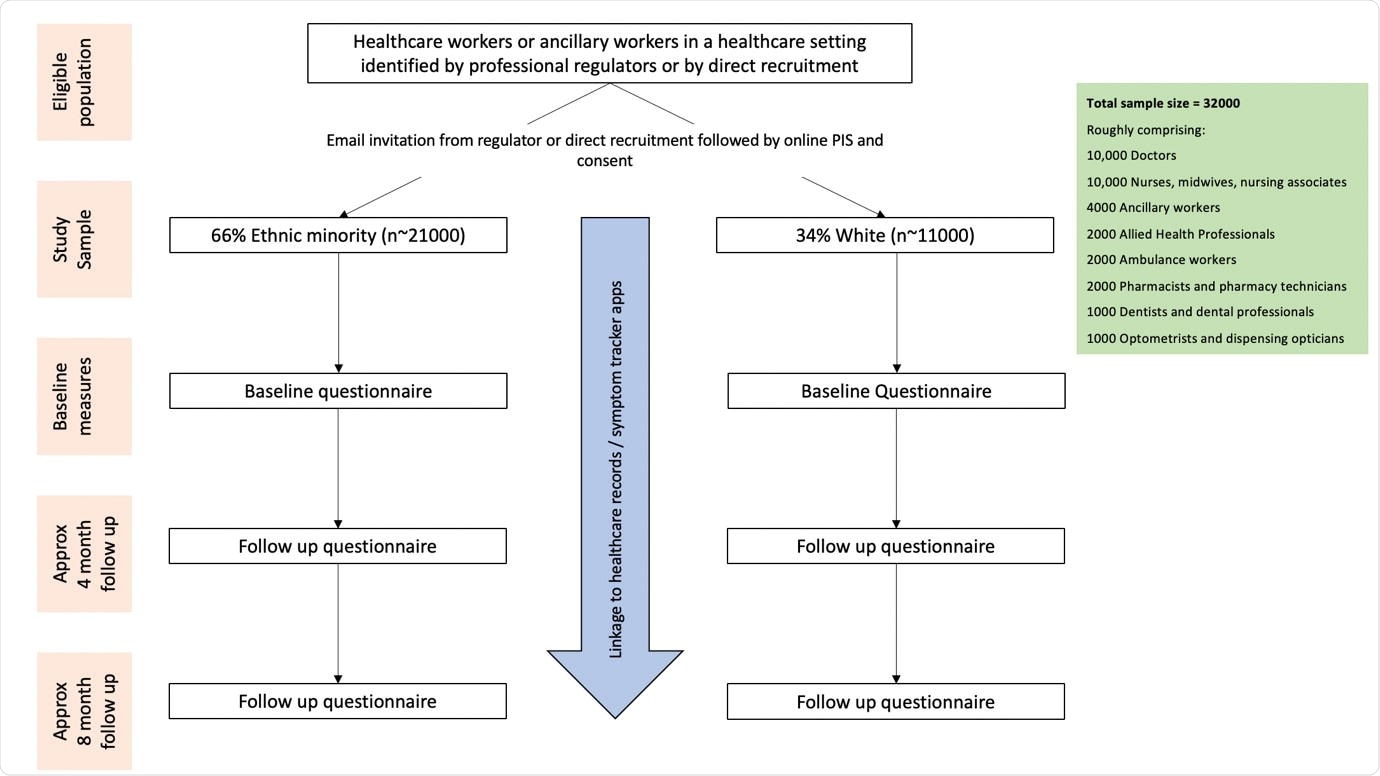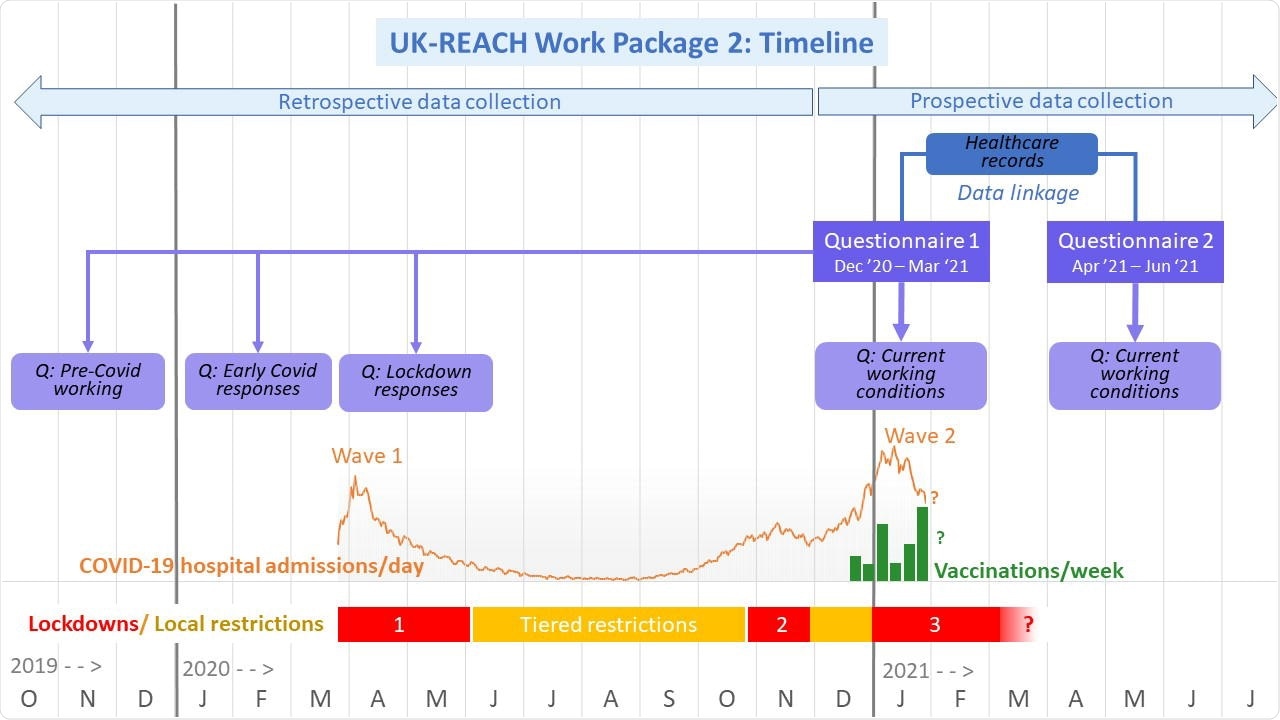Researchers in the UK have reported the protocol for a longitudinal study investigating the risk of adverse physical and mental health outcomes related to coronavirus disease 2019 (COVID-19) among healthcare workers from different ethnic groups.
The study aims to address the emerging evidence and growing concerns that healthcare workers (HCWs) from ethnic minority groups appear to be at a greater risk of adverse COVID-19 outcomes than white HCWs.
The protocol describes the UK-REACH (United Kingdom Research study into Ethnicity And COVID-19 outcomes in Healthcare workers) longitudinal cohort study.
Katherine Woolf from University College London Medical School and colleagues say questionnaire data will be collected from UK healthcare workers and ancillary workers at baseline, and then 4 months and 8 months from baseline. With consent, the data will be linked to healthcare records and participants will be followed for up to 25 years.
Multivariate analysis will be used to model changes over time and to understand the absolute and relative risks faced by different ethnic groups.
Results will be disseminated through reports to the government and papers that will be uploaded to preprint servers and submitted to peer-reviewed journals.
A preprint of this protocol report is available on the medRxiv* server, while the paper undergoes peer review.

Study flowchart

 This news article was a review of a preliminary scientific report that had not undergone peer-review at the time of publication. Since its initial publication, the scientific report has now been peer reviewed and accepted for publication in a Scientific Journal. Links to the preliminary and peer-reviewed reports are available in the Sources section at the bottom of this article. View Sources
This news article was a review of a preliminary scientific report that had not undergone peer-review at the time of publication. Since its initial publication, the scientific report has now been peer reviewed and accepted for publication in a Scientific Journal. Links to the preliminary and peer-reviewed reports are available in the Sources section at the bottom of this article. View Sources
Healthcare workers and ethnic groups seem to be at particular risk
Since the COVID-19 outbreak first began in Wuhan, China, in late 2019, the pandemic has resulted in significant morbidity and mortality, with the death toll having now reached more than 2.52 million globally.
Healthcare workers and ethnic minority groups are among the groups identified as being at an increased risk of infection with the causative agent – severe acute respiratory syndrome coronavirus 2 (SARS-CoV-2).
Emerging evidence also suggests that HCWs from ethnic minority groups are at an increased risk of adverse COVID-19-related physical and mental health outcomes, including anxiety, depression and post-traumatic stress.
“There are concerns that HCWs from ethnic minority groups are at particular risk of SARS-CoV-2 infection and adverse COVID-19 outcomes compared to white HCWs,” writes Woolf and colleagues.
However, to date, there has been no large-scale analysis of these outcomes and risks among HCWs or ancillary workers in the UK healthcare setting where the data is stratified by ethnicity, says the team.

UK-REACH Work package 2 timeline as of 4th February 2021. Dates are shown across the bottom from October 2019 to July 2021. The COVID-19 outbreak began in the UK in January 2020 with numbers of daily hospital admissions due to COVID-19 shown by the lower orange line for Wave one and Wave two. Vaccinations began in December 2020 and are shown by the green line for daily vaccinations. Lockdowns are shown by horizontal red bars, the first national lockdown beginning on March 23rd 2020, the second on November 5th, and the third of January 5th 2021. Lockdowns differed somewhat in timing between England, Wales, Scotland and Northern Ireland. Tiered local restrictions were in place in various regions of the UK between lockdowns, shown in yellow. Questionnaire 1 of Work package 2 began to be distributed on December 4th onwards and is being distributed until the end of March 2021. Questionnaire 1 asks about current events and working conditions, as well as retrospectively about events and working conditions pre-Covid in 2019, about early Covid responses in the first months of 2021, and about events during the first national lockdown. Questionnaire 2 will be distributed four months after registration for questionnaire 1 and therefore will be distributed between April and June 2021. Questionnaire 2 asks primarily about current working conditions, and changes to other aspects of participants’ lives captured in Questionnaire 1, including key measures of physical and mental health. With consent, the questionnaire data will be linked to electronic healthcare record data.
More about the UK-REACH longitudinal study
To address this, the UK-REACH longitudinal study will rapidly examine differences in COVID-19 diagnosis, clinical outcomes, professional roles, and well-being among ethnic minority groups and white HCWs (aged 16 years or older) living in all four nations of the UK.
The study will provide information on the very short-term outcomes to generate rapid actionable outputs and also enable future studies of the effects of COVID-19 on HCWs in the medium and long term.
Three waves of questionnaires
Between December 2020 and January 2021, participants received a baseline questionnaire about demographics, job role, physical and mental health, workplace location, residence, interaction with COVID-19 patients, social and living circumstances, and discrimination and harassment. The baseline questionnaire also collects some retrospective information about experiences and attitudes to work before and at the beginning of the pandemic.
Participants are then given the option of completing two further follow-up questionnaires, one at approximately 4 months from baseline and one at approximately 8 months from baseline. These questionnaires will cover the same outcomes as the baseline one, as well as any new items that become relevant as the pandemic progresses.
Participants will be asked for consent to follow them up over the course of 25 years, during which time serial questionnaire data will be gathered and periodically linked with healthcare records. Information will also be extracted from any COVID-19-related records and “symptom study” websites or apps the participants use.
The analysis and results
Univariate analysis will be used to assess associations between ethnicity and the primary outcomes –clinical COVID-19 outcomes and physical and mental health.
This will be followed by multivariable analysis to test for associations between ethnicity and key outcomes after controlling for confounding variables.
The follow-up data will be used in multilevel models to assess changes over time by ethnic group, thereby facilitating understanding of the absolute and relative risks among different ethnic groups.
“Results will be disseminated with reports to government and papers uploaded to preprint servers and submitted to peer-reviewed journals,” says Woolf and colleagues.

 This news article was a review of a preliminary scientific report that had not undergone peer-review at the time of publication. Since its initial publication, the scientific report has now been peer reviewed and accepted for publication in a Scientific Journal. Links to the preliminary and peer-reviewed reports are available in the Sources section at the bottom of this article. View Sources
This news article was a review of a preliminary scientific report that had not undergone peer-review at the time of publication. Since its initial publication, the scientific report has now been peer reviewed and accepted for publication in a Scientific Journal. Links to the preliminary and peer-reviewed reports are available in the Sources section at the bottom of this article. View Sources
Journal references:
- Preliminary scientific report.
Woolf K, et al. The United Kingdom Research study into Ethnicity And COVID-19 outcomes in Healthcare workers (UK-REACH): Protocol for a prospective longitudinal cohort study of healthcare and ancillary workers in UK healthcare settings. medRxiv, 2021. doi: https://doi.org/10.1101/2021.02.23.21251975, https://www.medrxiv.org/content/10.1101/2021.02.23.21251975v1
- Peer reviewed and published scientific report.
Woolf, Katherine, Carl Melbourne, Luke Bryant, Anna L Guyatt, I Chris McManus, Amit Gupta, Robert C Free, et al. 2021. “The United Kingdom Research Study into Ethnicity and COVID-19 Outcomes in Healthcare Workers (UK-REACH): Protocol for a Prospective Longitudinal Cohort Study of Healthcare and Ancillary Workers in UK Healthcare Settings.” BMJ Open 11 (9): e050647. https://doi.org/10.1136/bmjopen-2021-050647. https://bmjopen.bmj.com/content/11/9/e050647.